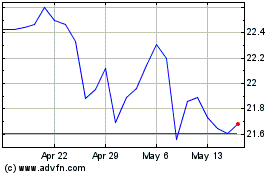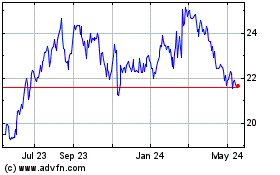In the face of shrinking economic growth projections and
continued business volatility, The Hackett Group, Inc. (NASDAQ:
HCKT) today issued research detailing six operational imperatives
designed to help companies combat economic uncertainty by enhancing
the efficiency and effectiveness of business services, including
finance, HR, IT, procurement, and supply chain operations.
According to The Hackett's Group new research, by focusing on
six imperatives and making significant process improvements and
other changes to various elements of their Service Delivery Model
(SDM) for business services, a typical global company (with $33.4
billion in revenue) could cut the cost of business services by up
to $302 million, or more than 25 percent. At the same time,
companies can improve the quality and timeliness of performance
information and decision-making processes, and also enhance
business agility and responsiveness.
The International Monetary Fund and others have notched back
their economic growth projections this year, in the face of an
array of potential challenges, including sovereign-debt defaults,
the collapse of the Euro currency, the so-called “fiscal cliff” in
the U.S., and a slowdown of growth in the Chinese economy. Any of
these scenarios could trigger a return to recession; in fact, the
worst-performing European countries are already experiencing this
“double dip.”
"Top performing companies have moved beyond an exclusive focus
on cost reduction in their transformation of business services.
Their overriding emphasis is to create better alignment to business
objectives, whether that means growth or scale-backs," said The
Hackett Group President of Advisory and Research Sean Kracklauer.
"They understand that each area of business services has a crucial
role to play if their company is to succeed in today's more
challenging environment.
"Our research clearly shows how companies can gain the most
value from their business services," continued Mr. Kracklauer.
"We've identified six principal imperatives for service delivery,
based on our SDM transformation framework, which ties the design of
each service component directly to business strategy, and empirical
data from our ongoing research and benchmarking with the world's
largest and most complex global companies."
The Hackett Group's SDM framework is designed to help companies
create an architecture and supporting design model for business
services that is scalable and also flexible enough to support both
operational agility and excellence. The SDM defines the who, where,
what, why and how for the execution of all business function
processes in support of the enterprise’s goals and objectives. It
includes the strategies, models and defined business benefits for
information, along with: service placement; process sourcing;
process design; enabling technology; skills and talent; and the
governance and organization of the business function. An optimized
SDM can help drive desired enterprise performance outcomes in terms
of increased growth and agility, plus decreased risk and cost.
The six imperatives outlined in The Hackett Group's new research
are as follows:
Imperative #1 - Pursue World-Class Cost Levels
Continuing uncertainty about business conditions ensures that
business services organizations will continue to be pressured to
take out cost. The Hackett Group recommends that business services
benchmark their current costs, identify the gaps to world-class
levels, and put in place transformation initiatives to close the
gaps.
The Hackett Group's research quantifies the significant cost
reduction opportunities available here. Typical companies can
realize average savings of 27% on the delivery of their main
business services functions by achieving world-class performance
levels. This translates into $302 million/year in savings for a
typical company with $33.4 billion in revenue. The savings include
$162 million/year from finance (47 percent cost reduction), $70
million from IT (13 percent cost reduction), $48 million from human
resources (32 percent cost reduction) and $22 million from
procurement (25 percent cost reduction). In total, these savings
amount to nearly one percent of revenue.
Imperative #2 - Reduce Complexity
Non-value-added complexity is one of the biggest impediments to
performance improvement. In finance, for example, reducing
application architecture and data complexity can enable process
cost reductions of nearly 50 percent. Application architecture
complexity also erodes the quality of information, decision-making
processes and operational agility.
Any SDM transformation initiative should consider the amount of
deviation from standard systems and processes – and how much
organization complexity – that is truly needed to support the
business. The Hackett Group's research indicates that companies are
very aggressively pursuing global standards across their SDM.
Imperative #3: Redesign Process, Governance and Organization
Models
The Hackett Group's research finds that two principal factors
correlate with significant differences between companies in terms
of service delivery performance: first, the level of end-to-end
process orientation, and second, the presence of systems,
governance, skills and organization models needed to effectively
implement it. The research shows strong growth in the adoption of
business process reengineering focused on an end-to-end approach
for both transactional and knowledge-centric process.
Imperative #4: Move from Functional Centralization to Global
Business Services
Global Business Services (GBS) represents the evolution of
shared services organizations into global, multi-function and
multi-process business services organizations. Over the last few
years, adoption of GBS has become a defining trend in the delivery
of business services. The Hackett Group's research indicates that
companies are aggressively moving resources who are involved in
delivering business services into GBS organizations. These
organizations go through three progressive stages of delivery of
business value, beginning with basic complexity reduction and
culminating in strategic business enablement. Today, most companies
are looking to migrate their GBS centers from Stage 1 to Stage 2
with the goal of significantly enhancing their value to the
enterprise.
Imperative #5: Build a Common Integrated Technology and
Information Architecture
Consolidation of the technology, information and application
architecture should be an objective of business services delivery
organizations. Architecture complexity drives higher costs by
requiring more IT resources to support it. Plus, it increases the
cost of business processes supported by the architecture.
Furthermore, process standardization and end-to-end processes are
much harder to implement on fragmented technology platforms. The
linkage with quality and timeliness of information, as well as
improved decision-making, is even more visible.
The Hackett Group's research confirms that the IT strategy of
technology architecture rationalization is a top priority.
Companies are planning to significantly reduce both application
platforms and instances over the next two to three years.
Imperative #6: Upgrade Talent to Support Today’s New
Realities
Talent is the most critical competitive differentiator today.
The common theme of the most successful business leaders of the
past few decades has been their ability to surround themselves with
top talent and create a culture of performance excellence.
While business services organizations cannot directly control
all aspects of talent management, they do have an important role to
play in creating a culture that fosters talent and excellence.
First, however, they need to upgrade their own talent. The Hackett
Group's global 2012 study of talent management reveals a large
shift in the kind of talent that business services organizations
need. Today’s sustained difficult environment makes attracting and
retaining these skills extremely challenging.
In addition, HR organizations must establish mature strategic
workforce planning, recruiting and performance review processes.
Compensation and benefits plans must be competitive as well. HR
must up its game and differentiate itself in the way it represents
the company if it wishes to attract scarce talent in a competitive
marketplace.
"Today more than ever, it's true that 'the only constant is
change,'" said The Hackett Group Chief Research Officer Michel
Janssen. "Having survived the recession, companies are now being
challenged to define and implement business strategies based on
assumptions of what the business climate beyond 'the new normal'
will look like.
"What is certain is that the world will look distinctly
different five years from now," said Mr. Janssen. "In response,
companies need to improve the quality and timeliness of business
information, their decision-making processes and operational
agility. This in turn has far-reaching implications for business
services delivery organizations. Every executive aspiring to enable
the business strategy must carefully assess these strategic
imperatives."
A complimentary version of this Research Insight is available,
following registration, at the following
http://www.thehackettgroup.com/research/2012/six-imperatives/.
About The Hackett Group
The Hackett Group (NASDAQ: HCKT), a global strategic business
advisory and operations improvement consulting firm, is a leader in
best practice advisory, business benchmarking, and transformation
consulting services including strategy and operations, working
capital management, and globalization advice.
Utilizing best practices and implementation insights from more
than 7,500 benchmarking studies, executives use The Hackett Group's
empirically-based approach to quickly define and implement
initiatives that enable world-class performance. Through its REL
group, The Hackett Group offers working capital solutions focused
on delivering significant cash flow improvements. Through its
Archstone Consulting group, The Hackett Group offers Strategy &
Operations consulting services in the Consumer and Industrial
Products, Pharmaceutical, Manufacturing, and Financial Services
industry sectors. Through its Hackett Technology Solutions group,
The Hackett Group offers business application consulting services
that help maximize returns on IT investments. The Hackett Group has
completed benchmark studies with over 2,800 major corporations and
government agencies, including 97% of the Dow Jones Industrials,
86% of the Fortune 100, 90% of the DAX 30 and 48% of the FTSE
100.
More information on The Hackett Group is available: by phone at
(770) 225-7300; by e-mail at info@thehackettgroup.com.
Hackett (NASDAQ:HCKT)
Historical Stock Chart
From Sep 2024 to Oct 2024

Hackett (NASDAQ:HCKT)
Historical Stock Chart
From Oct 2023 to Oct 2024
